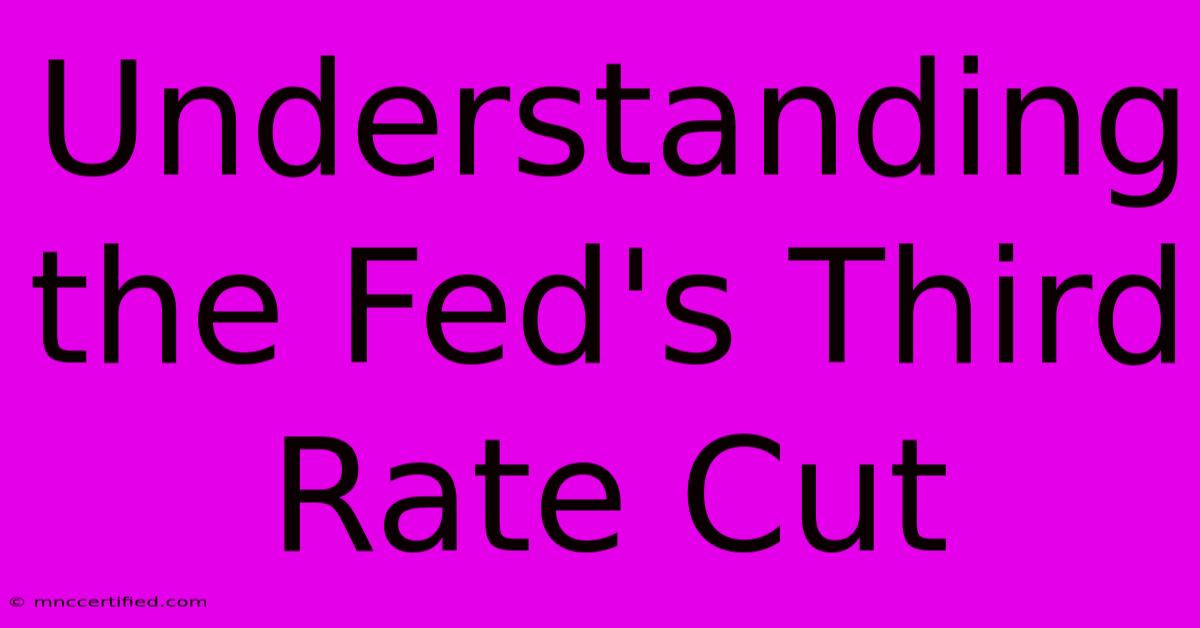Understanding The Fed's Third Rate Cut

Table of Contents
Understanding the Fed's Third Rate Cut: Implications and Outlook
The Federal Reserve's (Fed) recent decision to implement a third interest rate cut in 2023 has sent ripples through the financial markets. While intended to stimulate economic growth, the move is complex and carries both potential benefits and risks. This article delves into the reasons behind this decision, its potential impact, and what it means for the future of the US economy.
Why the Third Rate Cut?
The Fed's actions are largely a response to several intertwined economic factors:
-
Inflation Concerns: While inflation has been relatively subdued in recent months, there are concerns that it might not fall as quickly as projected. A rate cut aims to prevent a deflationary spiral, where falling prices lead to decreased consumer spending and economic stagnation. Understanding inflation's trajectory is crucial to gauging the effectiveness of monetary policy.
-
Slowing Economic Growth: Concerns over slowing global growth, particularly in key trading partners like China, have impacted the US economy. Lower interest rates aim to incentivize borrowing and investment, fostering economic activity and job creation. Monitoring GDP growth remains a key indicator for the Fed's decision-making process.
-
Geopolitical Uncertainty: Global uncertainties, including trade wars and geopolitical tensions, contribute to economic volatility. Rate cuts act as a buffer, providing a degree of stability during times of uncertainty. Analyzing geopolitical risks is therefore essential for a comprehensive understanding of the Fed's actions.
-
Unemployment Levels: While the unemployment rate remains relatively low, the Fed also considers broader labor market indicators such as participation rates and wage growth. A rate cut can help maintain employment levels by supporting business investment and expansion. Tracking key employment indicators is vital for assessing the overall health of the economy.
The Impact of the Rate Cut:
The implications of the third rate cut are multifaceted:
-
Lower Borrowing Costs: Lower interest rates make borrowing cheaper for consumers and businesses. This can spur increased spending and investment, boosting economic activity. However, it's important to note that the effect on consumer spending might be muted if other factors (like consumer confidence) are negative.
-
Stimulating Investment: Reduced borrowing costs encourage businesses to invest in expansion, hiring, and new projects. This, in turn, can lead to job growth and increased economic output. The impact on business investment is a key metric to monitor in the coming months.
-
Potential for Inflation: While a primary goal is to prevent deflation, the rate cut also carries the risk of fueling inflation. The Fed must carefully balance the need for economic stimulus with the risk of inflation spiraling out of control. Closely monitoring inflation data will be crucial for evaluating the effectiveness of the rate cut.
-
Currency Valuation: Lower interest rates can weaken the US dollar, potentially making US exports more competitive but also increasing the cost of imported goods. Understanding the impact on the dollar's value is an important consideration for both domestic and international businesses.
What's Next?
The effectiveness of the third rate cut will depend on several factors, including the overall global economic environment, consumer and business confidence, and the response of financial markets. The Fed will continue to monitor economic data closely and adjust its monetary policy as needed. Predicting the Fed's future moves is challenging, but analyzing current economic trends offers valuable insights. Further rate cuts or even increases are possibilities, depending on how the economy responds to the current actions.
Conclusion:
The Fed's third rate cut is a significant event with far-reaching consequences. While aiming to stimulate economic growth and prevent deflation, it also carries risks, including potential inflation and currency devaluation. A comprehensive understanding of the underlying economic factors and potential outcomes is crucial for investors, businesses, and policymakers alike. The coming months will offer crucial insights into the long-term effects of this policy decision.

Thank you for visiting our website wich cover about Understanding The Fed's Third Rate Cut. We hope the information provided has been useful to you. Feel free to contact us if you have any questions or need further assistance. See you next time and dont miss to bookmark.
Featured Posts
-
Celebrity Master Chef Gets New Judge
Dec 19, 2024
-
Southampton Liverpool Livestream Carabao
Dec 19, 2024
-
Fed Signals Fewer Rates Market Reaction
Dec 19, 2024
-
Store Closures Shoe Zone Locations Affected
Dec 19, 2024
-
Arsenal Dominates Palace Live Updates
Dec 19, 2024